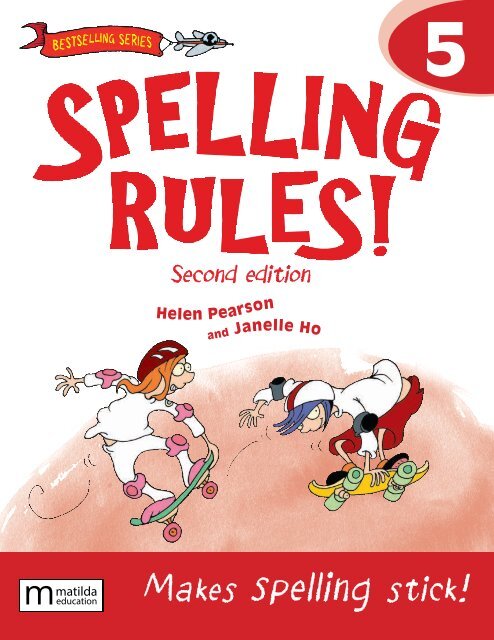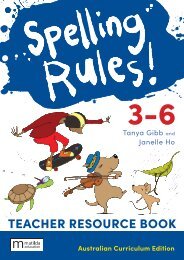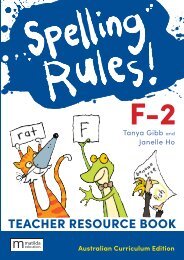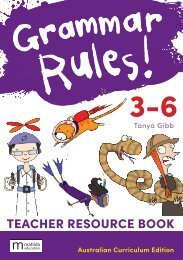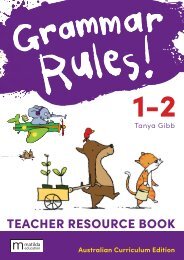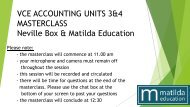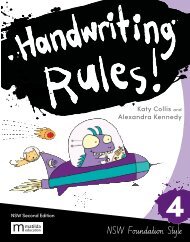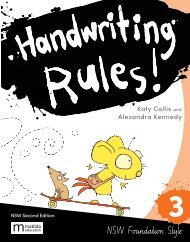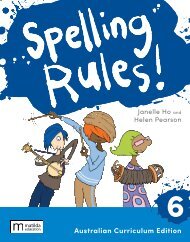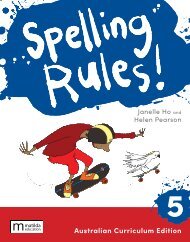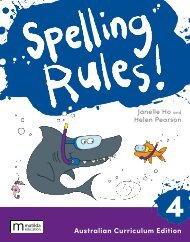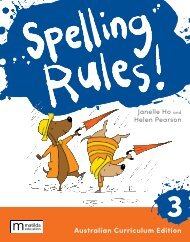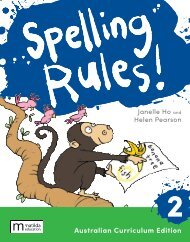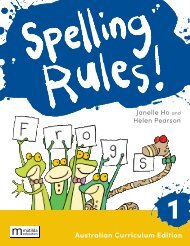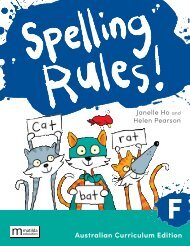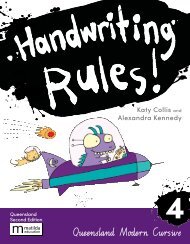Create successful ePaper yourself
Turn your PDF publications into a flip-book with our unique Google optimized e-Paper software.
BESTSELLI LING SERIES<br />
5<br />
Second edition<br />
Helen Pearson<br />
and Janelle Ho<br />
Makes<br />
spelling<br />
stick!
Second edition<br />
Helen Pearson<br />
and Janelle Ho<br />
STUDENT BOOK5<br />
Makes spelling stick!<br />
Name:<br />
Class:
Contents<br />
Scope and Sequence................................................................ 3<br />
Note to Teachers and Parents................................................... 4<br />
Units 1–35............................................................................... 6–75<br />
List Words in Unit Order.......................................................... 76<br />
List Words in Alphabetical Order.............................................. 78<br />
<strong>Spelling</strong> <strong>Rules</strong> and Tips.............................................................. 80<br />
SLLURP<br />
SLLURP summarises the spelling strategies that you can use to learn new words.<br />
Say<br />
Listen<br />
Look<br />
Understand<br />
Remember<br />
Practise<br />
Say the word carefully and slowly to yourself.<br />
Listen to how each part of the word sounds in sequence.<br />
Look at the patterns of letters in the word and the shape<br />
of the word.<br />
Understand rules, word meanings and word origins.<br />
Remember all the similar words you can already spell and<br />
relate this knowledge to any new word.<br />
Practise writing the word until it is firmly fixed in your<br />
long-term memory.<br />
2
Scope and Sequence This scope and sequence chart is based on the requirements of the Australian Curriculum.<br />
Skill focus<br />
Unit<br />
Page<br />
Sound-letter<br />
patterns<br />
Prefixes and<br />
suffixes<br />
(morphology)<br />
Other<br />
morphology<br />
Etymology<br />
Homophones/<br />
Confusing words<br />
1 6<br />
plural suffixes:<br />
s, es<br />
2 8 -ful homophones<br />
3 10<br />
-ment, -dom,<br />
-ship, -hood<br />
4 12<br />
-ous<br />
abbreviations,<br />
acronyms<br />
5 14<br />
ous -ous Latin and French<br />
root words<br />
6 16<br />
REVISION<br />
7 18 ch -logy Greek root words<br />
8 20<br />
-al, -ic; -ally<br />
9 22<br />
-able, -ible<br />
word families<br />
Topic<br />
words<br />
adverbs of<br />
frequency<br />
10 24 double consonants current/currant occupations<br />
11 26<br />
acronyms, blends,<br />
eponyms<br />
12 28<br />
REVISION<br />
13 30<br />
aw, or, au<br />
pause/paws/pores/<br />
pours<br />
14 32 mis-, dis-, anti- antonyms<br />
15 34 im-, in-, ir-, il- antonyms<br />
16 36 multiple affixes word families<br />
17 38 non-English words<br />
18 40<br />
REVISION<br />
19 42 qu<br />
20 44<br />
words ending in gue,<br />
que<br />
21 46<br />
ui<br />
sweet/suite, crews/cruise;<br />
suit/suite<br />
our<br />
regional spelling<br />
22 48<br />
differences<br />
(Australian and<br />
American)<br />
23 50<br />
Latin and Greek<br />
root words<br />
24 52<br />
REVISION<br />
25 54 oy, ay, ey<br />
26 56 y as vowel sound<br />
27 58 -ty<br />
28 60<br />
-ant, -ent<br />
current (adj) and<br />
current (noun)<br />
29 62 -ence, -ance conscience/conscious<br />
30 64<br />
REVISION<br />
31 66<br />
32 68<br />
sh sound: s, sh, ch, sch,<br />
si, ci, ti, ss, sci<br />
long oo sound: ew, oo,<br />
ue, u, ous; ow, aw<br />
-tial, -cial,<br />
-tious -cious, -ship<br />
33 70 silent letters Ireland/island<br />
34 72 Christmas<br />
35 74<br />
REVISION OF UNITS 1–34<br />
3
<strong>Spelling</strong> <strong>Rules</strong>!<br />
Some students are natural spellers. But the vast majority of students need formal, systematic and sequential<br />
instruction about the way spelling works and the strategies they can use to become independent, confident<br />
spellers and spelling risk-takers.<br />
The <strong>Spelling</strong> <strong>Rules</strong>! program is based on sound linguistic and pedagogical theory. It is informed by research<br />
into how students of different ages acquire and apply spelling skills, and how those skills move from the<br />
working to the long-term memory. The program closely follows the Australian English curriculum. Australian<br />
Curriculum: English references are provided in the Teacher Resource Books. The program consists of seven<br />
Student Books, fully supported by two Teacher Resource Books.<br />
Each student book contains units of work, with each unit designed to be used over<br />
the course of a week. The content of each unit simultaneously develops new skills<br />
and reinforces skills from previous units and earlier books. The introduction of new<br />
letter patterns is logically sequenced and takes into account both frequency of use<br />
and complexity. Where appropriate, topic words from other curriculum areas such<br />
as mathematics, science and social sciences are included. When spelling rules are<br />
introduced, only known sounds and letter patterns are used so that students focus<br />
on one skill at a time. Regular revision units enable teachers to assess student<br />
progress and reinforce key rules and patterns from previous units.<br />
<strong>Spelling</strong> knowledge<br />
Note to teachers and parents<br />
Learning to spell involves developing different kinds of spelling knowledge. In many<br />
cases, particularly in the upper grades, more than one kind of knowledge is called<br />
upon at a time. As they work through the activities in each <strong>Spelling</strong> <strong>Rules</strong>! unit,<br />
students will develop:<br />
N Kinaesthetic knowledge – the physical feeling when saying different sounds and<br />
words, and when writing the shapes of letters and words<br />
N Phonological knowledge – how a word sounds and the patterns of sounds in<br />
words<br />
N Visual knowledge – how letters and words <strong>look</strong> and the visual patterns in words<br />
N Morphemic knowledge – the meaning or function of words or parts of words<br />
N Etymological knowledge – the origins and history of words and the effect this has<br />
on spelling patterns.<br />
Icons used in Student Book 5<br />
Rule!<br />
Tip!<br />
This icon highlights useful spelling rules. The rule is always introduced the first time students<br />
will need it to complete an activity. There is also a handy summary of important rules on<br />
page 80.<br />
This icon tells students that a special clue or hint is provided for an activity. It may be<br />
a spelling, grammar or punctuation convention, or a definition of a useful term.<br />
4
<strong>Spelling</strong> <strong>Rules</strong>! Student Book 5 (ISBN 9781420236538) © Helen Pearson, Janelle Ho/Macmillan Education Australia<br />
<strong>Spelling</strong> <strong>Rules</strong>! Student Book 5 (ISBN 9781420236538) © Helen Pearson, Janelle Ho/Macmillan Education Australia<br />
Student Book 5<br />
Units of work<br />
Student Book 5 contains 35 weekly units of work. See the Scope<br />
and Sequence chart on page 3 for more information.<br />
Word lists<br />
<strong>Spelling</strong> lists enable a particular rule, letter pattern, sound pattern, etymology or morphemic element to<br />
be focused on, and they provide sufficient examples to consolidate the teaching point. In Student Book 5, each<br />
unit (except Revision) has a list of fifteen spelling words. The core words in the lists have been chosen<br />
to support the learning focus and strategies being taught in the unit. Topic words come from other<br />
curriculum areas, such as mathematics and social sciences. In addition, homophones and words that are<br />
easily confused with each other are explained and practised.<br />
The lists also include words to challenge the best spellers and provide the platform for teachers to<br />
extend their students’ spelling ability and vocabulary.<br />
SLLURP<br />
Each word list begins with a reminder for students to SLLURP. SLLURP summarises the strategies that<br />
will help spelling move from students’ working memory to their long-term memory. These strategies are<br />
provided on page 2, for easy reference.<br />
Unit at a glance<br />
SLLURP reminds students<br />
about strategies they can use<br />
to learn the words<br />
List words support<br />
the learning of the<br />
spelling focus for the<br />
unit. Words come from<br />
across the curriculum<br />
Space to practise list<br />
words; to write theme<br />
words, personal words<br />
or extension words;<br />
or to practise other<br />
words with the same<br />
spelling focus. Adapt<br />
this section to suit the<br />
needs of your class<br />
Unit Augie the world-record-holding dog is capable<br />
of holding how many tennis balls in his mouth?<br />
a three<br />
9<br />
b five<br />
c ninety-two<br />
Say Listen Look Understand Remember Practise I Add ible or able to make a list word.<br />
3<br />
reliable<br />
capable<br />
adorable<br />
available<br />
comfortable<br />
miserable<br />
valuable<br />
horrible<br />
terrible<br />
sensible<br />
flexible<br />
impossible<br />
invisible<br />
eligible<br />
illegible<br />
Complete the table to build word families.<br />
Unit banner features<br />
the spelling focus in the<br />
context of a fun quiz<br />
about sport<br />
2<br />
reli<br />
invis<br />
ador<br />
cap<br />
comfort<br />
sens<br />
flex<br />
terr<br />
miser<br />
valu<br />
Draw a line to match each adjective to its meaning.<br />
Use a dictionary if you need help.<br />
edible<br />
visible<br />
legible<br />
audible<br />
portable<br />
inflatable<br />
intelligible<br />
able to be carried<br />
able to be heard<br />
able to be understood<br />
able to be eaten<br />
able to be seen<br />
able to be read<br />
able to be filled with air<br />
noun adjective adverb<br />
reliability<br />
reliably<br />
valuable<br />
capability<br />
comfortable<br />
suitability<br />
invisible<br />
flexibility<br />
responsibly<br />
Suffixes -able, -ible; word families<br />
22 23<br />
Rule!<br />
If the base word ends in silent e, the e is usually dropped before adding ible or able.<br />
believable, collapsible<br />
Some exceptions: noticeable, changeable, likeable, manageable<br />
4 Change each verb to an adjective by adding able. 5 Change each verb to an adjective by adding ible.<br />
desire<br />
response<br />
admire<br />
sense<br />
forgive<br />
collapse<br />
notice<br />
submerse<br />
consider<br />
reverse<br />
profit<br />
flex<br />
6<br />
Add a suitable adjective that ends in able or ible.<br />
a chair an baby<br />
an journey a shock<br />
a nappy a seatbelt<br />
a friend a organiser<br />
7 Complete each sentence using an antonym of the word in brackets.<br />
The old sofa was very<br />
. (comfortable)<br />
The voice on the other end of the phone was<br />
. (mistakable)<br />
My brother even destroys toys that are guaranteed to be<br />
! (destructible)<br />
The deep snow made the road<br />
. (passable)<br />
Yusef is<br />
of seeing a ball without throwing or kicking it. (capable)<br />
8<br />
illegible<br />
eligible<br />
Answer: b<br />
These words are sometimes confused. Use a dictionary to write a definition for each word.<br />
Write a sentence using each word.<br />
definition<br />
in a sentence<br />
definition<br />
in a sentence<br />
<strong>Spelling</strong> focus<br />
highlighted in<br />
colour<br />
<strong>Spelling</strong> tips and<br />
rules introduced<br />
when students need<br />
them to complete<br />
an activity<br />
Sequenced<br />
activities – some<br />
activities refer to<br />
content in other<br />
curriculum areas<br />
Answer to<br />
the quiz in the<br />
unit banner<br />
Footer shows<br />
the spelling focus<br />
for the unit<br />
<strong>Spelling</strong> <strong>Rules</strong>! Teacher Resource Book 3-6<br />
Full teacher support for Student Book 5 is provided by <strong>Spelling</strong> <strong>Rules</strong>! Teacher Resource Book 3-6. Here you<br />
will find valuable background information about spelling development and spelling knowledge, along with<br />
practical resources, such as:<br />
N teaching tips for every unit in Student Book 5 N guidelines for assessment and diagnosis of errors<br />
N extra word lists<br />
N activities to support struggling spellers<br />
N strategies for teaching spelling<br />
N worthwhile extension for more able spellers.<br />
5
Unit<br />
I<br />
Which of these activities is performed in circuses?<br />
a lawn bowls<br />
b tight-rope walking<br />
c loose-rope waddling<br />
Say Listen Look Understand Remember Practise<br />
circuses<br />
stitches<br />
mattresses<br />
quizzes<br />
viruses<br />
geniuses<br />
sandwiches<br />
scarves<br />
valleys<br />
chimneys<br />
factories<br />
priorities<br />
trousers<br />
handkerchiefs<br />
volcanoes<br />
Rule!<br />
I<br />
If a noun ends in s, ss, ch, sh, x or z,<br />
add es to form the plural.<br />
Exceptions: stomachs (just add s) and<br />
quizzes (double the z before adding es).<br />
Write the plural ending for each noun.<br />
bus witness quiz<br />
ostrich waltz fox<br />
stomach rash match<br />
mattress stitch circus<br />
Rule!<br />
If a noun ends in a vowel + y, add s to<br />
form the plural.<br />
highway highways<br />
If a noun ends in a consonant + y, change<br />
the y to i and add es to form the plural.<br />
copy copies berry berries<br />
2<br />
Write the plural.<br />
donkey valley mystery chimney factory<br />
worry tray trolley priority trophy<br />
3<br />
Write the singular.<br />
kidneys mysteries journeys<br />
Tip!<br />
Some words do not change in the plural.<br />
dozen sheep<br />
Some words change the vowel or vowels to show the plural.<br />
man men tooth teeth crisis crises<br />
6<br />
<strong>Spelling</strong> <strong>Rules</strong>! Student Book 5 (ISBN 9781420236538) © Helen Pearson, Janelle Ho/Macmillan Education Australia
4<br />
Write the singular for each noun.<br />
women sheep children crises feet<br />
Rule!<br />
Nouns that end in o usually add es to form the plural. mosquitoes<br />
Some exceptions: foreign words (kimonos), abbreviations (rhinos) and words ending in<br />
two vowels (videos).<br />
5<br />
Circle the correct plural form.<br />
radios<br />
radioes<br />
potatos<br />
potatoes<br />
flamingos<br />
flamingoes<br />
banjos<br />
banjoes<br />
photos<br />
photoes<br />
mosquitos<br />
mosquitoes<br />
Rule!<br />
Nouns that end in f usually change the f to v before adding es to form the plural.<br />
half halves<br />
All nouns ending in ff, and some nouns ending in f, just add s to form the plural.<br />
cliffs gulfs chiefs<br />
6<br />
Rewrite these sentences, making the nouns plural if possible. Change other words when necessary.<br />
One puff of wind blew the scarf away.<br />
The wolf knocked the knife off the shelf.<br />
Tip!<br />
Eponyms are words that were originally the name of a person or place.<br />
Braille is a writing system named after its inventor, Louis Braille.<br />
7<br />
Match each words to its origin.<br />
sandwich rugby marathon pavlova<br />
snack named after an earl who was too busy to eat a proper meal<br />
meringue-based dessert named after a Russian ballerina<br />
long race named after a place in ancient Greece<br />
game where you run with a ball, named after a school in England<br />
Answer: b<br />
Plural suffixes s, es<br />
<strong>Spelling</strong> <strong>Rules</strong>! Student Book 5 (ISBN 9781420236538) © Helen Pearson, Janelle Ho/Macmillan Education Australia<br />
7
Unit<br />
2<br />
Which of these animals can be trained to be skilful surfers?<br />
a pandas<br />
b cows<br />
c dogs<br />
Say Listen Look Understand Remember Practise<br />
useful<br />
scornful<br />
awful<br />
skilful<br />
wilful<br />
grateful<br />
beautiful<br />
peaceful<br />
wonderful<br />
resentful<br />
deceitful<br />
thoughtful<br />
delightful<br />
successful<br />
plentiful<br />
Tip!<br />
I<br />
2<br />
Adding the suffix ful sometimes changes<br />
the spelling of the base word.<br />
pity pitiful<br />
Write the base word for these adjectives.<br />
skilful<br />
beautiful<br />
awful<br />
wilful<br />
plentiful<br />
fanciful<br />
Group the base words of these adjectives.<br />
powerful boastful colourful<br />
forgetful peaceful resentful<br />
base word = noun<br />
base word = verb<br />
3<br />
Write a list word that rhymes.<br />
dutiful<br />
insightful<br />
hateful<br />
mournful<br />
Tip!<br />
Antonyms are words that are opposite in meaning.<br />
Antonyms can be made by:<br />
• adding a prefix helpful unhelpful<br />
• changing the suffix careful careless<br />
4<br />
Write an antonym for each word.<br />
successful grateful thoughtful<br />
joyful harmful useful<br />
8<br />
<strong>Spelling</strong> <strong>Rules</strong>! Student Book 5 (ISBN 9781420236538) © Helen Pearson, Janelle Ho/Macmillan Education Australia
5<br />
Make an adverb by adding ly to each adjective. Use each adverb in a sentence.<br />
skilful<br />
successful<br />
Tip!<br />
Homophones are words that sound the same but are spelt differently.<br />
heal (recover from injury) and heel (part of a foot) are homophones.<br />
6<br />
Write the homophone. Use the picture as a clue.<br />
peace<br />
ore<br />
great<br />
waste<br />
steel<br />
source<br />
Tip!<br />
Words for quantities sometimes end in ful.<br />
cupful<br />
7<br />
Use a word with the suffix ful to complete each sentence.<br />
Uncle Jim refuses to drink tea unless it has a<br />
of sugar in it.<br />
It should only take one<br />
of water to wash a car.<br />
Che took one<br />
of milk and spat it out. It was sour!<br />
8<br />
Proofread this recount. The recount has five words that are incorrect. Circle the mistakes. Then write<br />
the correct spelling of the words in the boxes.<br />
Mrs Jones, our neighbour, is over 80 but she is still quite energetic. Yesterday she waved cheerfuly<br />
as she walked past on her way to the shops. A few minutes later I heard her call out in pain. She<br />
had triped on a crack in the footpath and was lying on the ground. She had torn her trowsers and<br />
an awful lot of blood was dripping down her leg. Mum took her to the doctor and the cut needed<br />
five stitchs. Mrs Jones was greatful that we were nearby when she needed help.<br />
Answer: c<br />
Adding suffix -ful; homophones<br />
<strong>Spelling</strong> <strong>Rules</strong>! Student Book 5 (ISBN 9781420236538) © Helen Pearson, Janelle Ho/Macmillan Education Australia<br />
9
Unit<br />
3<br />
What is the greatest depth underwater that a diver<br />
has ever gone without any breathing equipment?<br />
a 40 metres<br />
b 2000 metres<br />
c 200 metres<br />
Say Listen Look Understand Remember Practise<br />
argument<br />
measurement<br />
amazement<br />
excitement<br />
achievement<br />
equipment<br />
instrument<br />
experiment<br />
implement<br />
environment<br />
advertisement<br />
disappointment<br />
boredom<br />
championship<br />
neighbourhood<br />
I<br />
2<br />
Write a list word for each clue.<br />
it tries to sell you something<br />
local area<br />
the world around us<br />
a tool<br />
use this to make music<br />
a persuasive text<br />
Write the list word that contains the smaller word.<br />
strum<br />
sure<br />
item<br />
point<br />
our<br />
rim<br />
red<br />
gum<br />
Tip!<br />
The suffixes ment, dom, ship and hood all form nouns.<br />
The base word does not usually change when ment, dom, ship or hood are added.<br />
3<br />
Add ment, dom, ship or hood to each word to form the noun.<br />
free leader child advertise<br />
champion achieve hard equip<br />
king employ govern adult<br />
4<br />
Write the base word for each noun. Circle the word if the spelling of the base word has changed.<br />
wisdom movement argument boredom<br />
10<br />
<strong>Spelling</strong> <strong>Rules</strong>! Student Book 5 (ISBN 9781420236538) © Helen Pearson, Janelle Ho/Macmillan Education Australia
5<br />
Each group of words forms a category. Write a list word for each category and add more examples.<br />
Category<br />
Examples<br />
violin, flute, drum, ,<br />
hours, metres, grams, ,<br />
erosion, recycling, pollution, ,<br />
Tip!<br />
Synonyms are words with the same or similar meanings.<br />
grateful and thankful are synonyms.<br />
6<br />
Write a list word that is a synonym.<br />
trial disagreement tools wonder<br />
Tip!<br />
Some words ending in ment can function as both nouns and verbs.<br />
Look at the document. (noun)<br />
You should document the process. (verb)<br />
7<br />
Use each word as a noun and as a verb.<br />
experiment<br />
compliment<br />
(noun)<br />
(verb)<br />
(noun)<br />
(verb)<br />
Tip!<br />
When two or more words start with the same sound, it is called alliteration.<br />
Jack danced a jolly jig when he got the joyful news.<br />
8<br />
Add a descriptive word to complete these alliterations. Write your own alliterative sentence.<br />
Charlie cheerfully challenged the<br />
champion.<br />
Debbie was<br />
disappointed to miss the dance.<br />
Ann accepted the award in<br />
amazement.<br />
Erin<br />
explained her experiment to the visiting expert.<br />
Answer: c<br />
Adding suffixes -ment, -dom, -ship, -hood<br />
<strong>Spelling</strong> <strong>Rules</strong>! Student Book 5 (ISBN 9781420236538) © Helen Pearson, Janelle Ho/Macmillan Education Australia<br />
11
Unit<br />
4<br />
What sport is Tony Hawk famous for?<br />
a BASE-jumping<br />
b skateboarding<br />
c lion taming<br />
Say Listen Look Understand Remember Practise<br />
famous<br />
dangerous<br />
humorous<br />
enormous<br />
marvellous<br />
anxious<br />
serious<br />
curious<br />
obvious<br />
cautious<br />
adventurous<br />
ridiculous<br />
venomous<br />
mischievous<br />
anonymous<br />
Words that end in ous are adjectives.<br />
Rule!<br />
I<br />
Complete the table.<br />
noun<br />
adjective<br />
religious<br />
caution<br />
mischievous<br />
marvel<br />
hazardous<br />
curiosity<br />
anxious<br />
venom<br />
ambitious<br />
danger<br />
Rule!<br />
If the base word ends in e, drop the<br />
e before adding ous.<br />
fame<br />
famous<br />
Rule!<br />
If the base words ends in our,<br />
drop the u before adding ous.<br />
humour humorous<br />
Exceptions: words ending in ce or ge.<br />
2<br />
Add the suffix ous.<br />
3<br />
Add the suffix ous.<br />
adventure<br />
glamour<br />
nerve<br />
vigour<br />
ridicule<br />
rigour<br />
carnivore<br />
odour<br />
12<br />
<strong>Spelling</strong> <strong>Rules</strong>! Student Book 5 (ISBN 9781420236538) © Helen Pearson, Janelle Ho/Macmillan Education Australia
4<br />
Write a list word to describe each set of nouns.<br />
: Uluru, brontosaurus, road train<br />
: cartoon, riddle, joke<br />
: funnel-web spider, viper, stonefish<br />
: gun, electricity, bushfire<br />
: Albert Einstein, Mother Teresa, Neil Armstrong<br />
5<br />
Write list words.<br />
Newspapers never print<br />
letters. Each letter must be signed.<br />
Graffiti is a<br />
problem in our community.<br />
“Raising $1000 is a<br />
achievement,” said Mr Lewis.<br />
Mia blushed because she thought her mistake was<br />
to everyone.<br />
I am<br />
to know how Grandpa got a scar on his chin.<br />
6<br />
These pairs of words are synonyms. One word in each pair has a spelling error. Circle the misspelt<br />
word and write it correctly as part of a noun group: a ridiculous costume.<br />
poisonous – venormous<br />
adventurous – darring<br />
anxous – worried<br />
furious – angrey<br />
humourous – amusing<br />
Tip!<br />
Abbreviations are short forms of longer words. St = Street<br />
An acronym is a word formed from the initial letters of other words.<br />
PIN = personal identification number<br />
7<br />
Write the full word or group of words for these abbreviations and acronyms. You can use a dictionary.<br />
anon.<br />
govt<br />
radar<br />
Anzac<br />
UN<br />
STEM<br />
pop.<br />
ICT<br />
ATM<br />
Answer: b<br />
Adding suffix -ous; abbreviations and acronyms<br />
<strong>Spelling</strong> <strong>Rules</strong>! Student Book 5 (ISBN 9781420236538) © Helen Pearson, Janelle Ho/Macmillan Education Australia<br />
13
Unit<br />
5<br />
What did victorious athletes win in<br />
the Ancient Greek Olympic games?<br />
a a wreath of olive leaves<br />
b a basket of pine cones<br />
c a pie in the face<br />
Say Listen Look Understand Remember Practise<br />
furious<br />
envious<br />
various<br />
victorious<br />
precious<br />
delicious<br />
luxurious<br />
conscious<br />
gorgeous<br />
hideous<br />
courteous<br />
courageous<br />
outrageous<br />
contagious<br />
miscellaneous<br />
I<br />
Group the list words according to the number of<br />
syllables you hear.<br />
2<br />
Circle g and the letter after it if it makes the soft g sound.<br />
outrageous contagious gorgeous courageous<br />
generous gracious religious glorious<br />
Tip!<br />
If the base word ends in ce or y, change the e or y to i before adding ous.<br />
vary various<br />
3<br />
Add the suffix ous.<br />
envy space glory<br />
vice luxury fury<br />
grace mystery victory<br />
4<br />
Write the list word that contains each smaller word.<br />
fur tag hide<br />
lane rage out<br />
14<br />
<strong>Spelling</strong> <strong>Rules</strong>! Student Book 5 (ISBN 9781420236538) © Helen Pearson, Janelle Ho/Macmillan Education Australia
5<br />
Each word is missing the sound sh, but it can be written in different ways. Write the missing letters.<br />
deli — — ous cau — — ous con — — — ous spa — — ous<br />
vi — — ous pre — — ous ambi — — ous suspi — — ous<br />
an — — ous infec — — ous gra — — ous fero — — ous<br />
Tip!<br />
Etymology is the study of word origins.<br />
Many English words have their origins in words from other languages.<br />
6<br />
Write the list word that has come from each word.<br />
Delicia is the Latin word for delight.<br />
Outre is the old French word meaning beyond.<br />
Furia is the Latin word for rage.<br />
Precios is an old French word meaning costly.<br />
Cor is the Latin word for heart.<br />
7<br />
Write a synonym ending in ous. Choose two to use in a sentence.<br />
angry contagious brave<br />
jealous hazardous successful<br />
Rule!<br />
Comparative adjectives compare two things.<br />
My younger sister is more adventurous than I am.<br />
Superlative adjectives compare three or more things.<br />
The smallest spiders can also be the most venomous.<br />
8<br />
Complete the tables.<br />
adjective<br />
comparative form<br />
adjective<br />
superlative form<br />
heavy<br />
strange<br />
beautiful<br />
dangerous<br />
curious<br />
useful<br />
Answer: a<br />
Adding suffix -ous; words ending in ous; Latin and French root words<br />
<strong>Spelling</strong> <strong>Rules</strong>! Student Book 5 (ISBN 9781420236538) © Helen Pearson, Janelle Ho/Macmillan Education Australia<br />
15
Revisi0n<br />
Revision<br />
I<br />
Unit<br />
6<br />
Lawnmower motors were once a useful addition<br />
to the equipment used in which sport?<br />
a horse racing<br />
b triathlon<br />
c karting<br />
Add a suffix to each word. Group the new words.<br />
success<br />
argue<br />
wise<br />
humour<br />
champion<br />
luxury<br />
mischief<br />
leader<br />
dom<br />
ous<br />
ful<br />
ship<br />
hood<br />
ment<br />
Nouns<br />
Adjectives<br />
2<br />
Write the plural.<br />
patch fortress factory knife box<br />
quiz sheep wolf stomach volcano<br />
3<br />
Use the clues to make a word.<br />
furious + c<br />
precious + v<br />
humorous + n + e<br />
courteous + a + g<br />
a ment con ious<br />
de ful neighbour<br />
pe ful s ful<br />
g eful ker<br />
16<br />
<strong>Spelling</strong> <strong>Rules</strong>! Student Book 5 (ISBN 9781420236538) © Helen Pearson, Janelle Ho/Macmillan Education Australia
4<br />
Use the clues to complete the puzzle.<br />
F U L<br />
F U L<br />
F U L<br />
F U L<br />
F U L<br />
F U L<br />
F U L<br />
1. terrible<br />
2. of use<br />
3. causes harm<br />
4. without conflict<br />
5. very sad<br />
6. very pleasant<br />
7. shameful<br />
5 Write a synonym.<br />
6 Write an antonym.<br />
poisonous<br />
careful<br />
worried<br />
valuable<br />
pensive<br />
thoughtless<br />
cowardly<br />
rude<br />
conscious<br />
scarce<br />
7<br />
Write an alliterative word to complete each sentence.<br />
The fire’s<br />
We heard a<br />
David devoured a dozen<br />
flames devoured the forest.<br />
howl coming from the haunted house.<br />
donuts.<br />
8<br />
Replace the phrases with an adverb ending in ly.<br />
Tom<br />
wrote a rhyming poem about his teacher, Ms Cross. The poem<br />
without signing his name<br />
was<br />
worded and praised Ms Cross. Tom left the poem on his teacher’s desk.<br />
with humour<br />
Later he watched as Ms Cross read the poem .<br />
with anxiety<br />
with care<br />
His teacher <strong>look</strong>ed at Tom and smiled .<br />
with mischief<br />
“Tom wrote this fine poem extremely well.<br />
That he is a poet is easy to tell,<br />
For in making jokes does our Tom excel.<br />
It’s such a shame he’s not learnt to spell!”<br />
Answer: c<br />
Revision<br />
<strong>Spelling</strong> <strong>Rules</strong>! Student Book 5 (ISBN 9781420236538) © Helen Pearson, Janelle Ho/Macmillan Education Australia<br />
17
Unit<br />
7<br />
Modern technology is used to measure<br />
the speed of the serve in which sport?<br />
a figure skating<br />
b tea parties<br />
c tennis<br />
Say Listen Look Understand Remember Practise<br />
echo<br />
ache<br />
choir<br />
chorus<br />
anchor<br />
chemist<br />
stomach<br />
orchid<br />
chronic<br />
orchestra<br />
architect<br />
technology<br />
character<br />
psychology<br />
archaeology<br />
I<br />
2<br />
Colour the circle blue if ch makes the sound in chip.<br />
Colour the circle red if ch sounds like k.<br />
Colour the circle green if ch sounds like sh.<br />
ache<br />
stomach<br />
machine<br />
champion<br />
scheme<br />
zucchini<br />
reach<br />
chemist<br />
anchor<br />
character<br />
charades<br />
parachute<br />
Fill in the missing vowels to make list words.<br />
ch — — r<br />
— rch — str _<br />
— nch — r ps — ch — l — gy<br />
st — m — ch<br />
chr — n — c<br />
ch — m — st<br />
— rch — — — l — gy<br />
— ch — t — chn — l — gy<br />
3 Write a list word for each clue.<br />
4 Write the plural.<br />
a group of singers<br />
a designer of buildings<br />
an internal organ<br />
an exotic flower<br />
personality<br />
a group of instruments<br />
lasting a long time<br />
used to moor a ship<br />
echo<br />
chorus<br />
ache<br />
orchestra<br />
technology<br />
character<br />
stomach<br />
chemist<br />
18<br />
<strong>Spelling</strong> <strong>Rules</strong>! Student Book 5 (ISBN 9781420236538) © Helen Pearson, Janelle Ho/Macmillan Education Australia
5<br />
Some English words are related to Greek words. Use a dictionary to find English words beginning with<br />
a hard ch (sounds like k) that are related to these Greek words.<br />
1<br />
2<br />
3<br />
4<br />
C<br />
C<br />
C<br />
C<br />
H<br />
H<br />
H<br />
H<br />
R<br />
E<br />
1. choros = song and dance<br />
2. chroma = colour<br />
E 3. chronikos = to do with time<br />
S 4. chrysallis = golden case<br />
5<br />
C<br />
H<br />
M<br />
5. chrysanthemon = golden flower<br />
6<br />
Draw a line to match each logy word to its meaning.<br />
meteorology<br />
archaeology<br />
psychology<br />
geology<br />
biology<br />
zoology<br />
cosmology<br />
toxicology<br />
etymology<br />
the study of the mind and behaviour<br />
the study of poisons<br />
the study of animals<br />
the study of living things<br />
the study of rocks and minerals<br />
the study of the past by digging up buried objects<br />
the study of word origins<br />
the study of the origins of the universe<br />
the study of weather<br />
7<br />
Join these simple sentences into one logical sentence using the word or words indicated.<br />
I had an earache. I went to the chemist to buy some drops. (so)<br />
Rachel is an archaeologist. Rachel spends a lot of time overseas. (who)<br />
The searchers were able to accurately locate the ancient anchor. They used modern technology.<br />
(by using)<br />
Answer: c<br />
Consonant digraph ch; suffix -logy; Greek root words<br />
<strong>Spelling</strong> <strong>Rules</strong>! Student Book 5 (ISBN 9781420236538) © Helen Pearson, Janelle Ho/Macmillan Education Australia<br />
19


